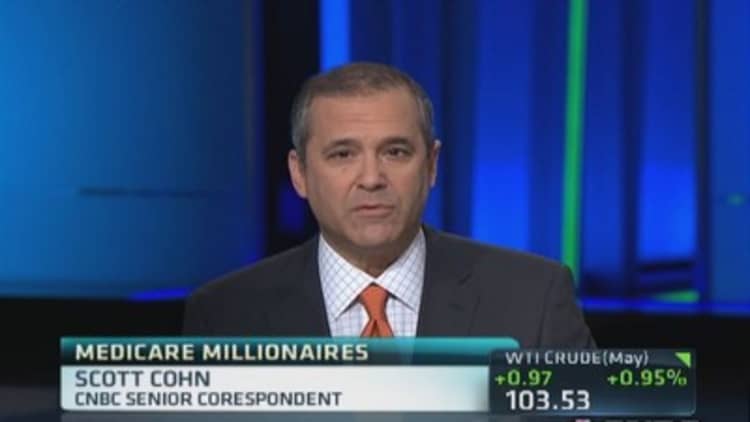Federal officials said they hope Wednesday's "unprecedented" disclosure of data about $77 billion in Medicare reimbursements to 880,000 physicians and other providers in 2012 will lead to reporters and researchers uncovering fraud, waste and unwarranted variations in treatment that could lead to significant cost savings in the future.
Those officials also said it was "impossible" to quantify how much taxpayer money could have been saved in the past if such Medicare data hadn't been kept secret for 35 years, and instead had been available for independent analysis.
"I'm sure that there are savings that would have been achievable," said Chris Holt, director of health-care policy for the American Action Forum. "I'm sure that there were savings that weren't realized, but I'm not sure how much that has been."
But Cristina Boccuti, who analyzes Medicare policy for the Kaiser Family Foundation, said that having data about how much the government was paying individual doctors in past decades could have led to big cost savings, particularly if such data were publicly available in the 2000s, and if Medicare authorities had adjusted their policies in response.
Read MoreHere's what really fueled the Obamacare surge
In that decade, both the volume and intensity of certain procedures increased significantly, Boccuti said. She added the data would have exposed the trend and raised questions about whether it was justified, and if these procedures should have been reimbursed at the same rates.
"It wasn't understood how rapidly the volume was growing for a while," Boccuti said.
She said that with the release of the 2012 data on Medicare reimbursements nationwide, "it will be more easy to detect variation between individual providers."
"I think over time there may be further analysis and research on why certain providers and physicians are providing many more services and procedures for patients in the same specialty," Boccuti said. "That is analysis that over time could lower spending."
Read MoreInsurance a tough sell for young? Blame mom and dad
Medicare is the federally run health insurance program for adults age 65 and over, and covers tens of millions of people.
Data about Medicare reimbursements to individual providers had been secret since 1979 as a result of a federal injunction obtained by the American Medical Association, which argued that such a disclosure of how taxpayer money was flowing to identifiable doctors violated the physician's privacy.
In 2013, a judge overturned that injunction—and early Wednesday morning the Centers for Medicare and Medicaid Services released electronic links to reimbursement data for the year 2012.
News stories about the data highlighted the fact that a very small percentage of doctors nationally accounted for nearly 25 percent of the $77 billion paid in Medicare reimbursements, including a South Florida physician who received a whopping $21 million.
"We believe the public has a right to know this information," said Jonathan Blum, CMS principal deputy administrator. "It has not been made public for too long."
And, Blum added, "We know that there's waste in the system, we know that there's fraud in the system."

"We want the public's help, we want reporters' help to identify spending that appears to be wasteful," Blum said. "We want the press and outside researchers to mine this data to find outliers, to identify spending that does not appear to be in the beneficiaries' interest and taxpayers' interest."
He said that in addition to helping reduce unnecessary spending, analysis of the data by outside sources could also help "improve care coordination [and] improve care quality."
Read MoreFinal Obamacare deadline (for real!) is tax day
When CNBC asked Blum how much could have been saved in the past if the data had been released in prior years, he said: "That's impossible to answer. ... The question is the right one. It's difficult to have a precise number."
Ceci Connolly, managing director of the Health Research Institute at PricewaterhouseCoopers, said that with Wednesday's big data dump, "it's as if we've been in a pitch-black cave for decades, and we just stepped out into really bright sunlight."
"I can't wait to see all the discoveries that are made in coming days and weeks and months," Connolly said. "We know there is wide variation [in treatment] and this is going to help us identify that better and really take us in the direction of what works and why and stop things that don't work."
"We as a nation are finally accepting that we don't get our money's worth out of the health-care system," she said. "The only way you can improve is to actually know what the current picture is."
—By CNBC's Dan Mangan


